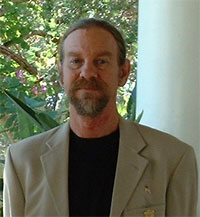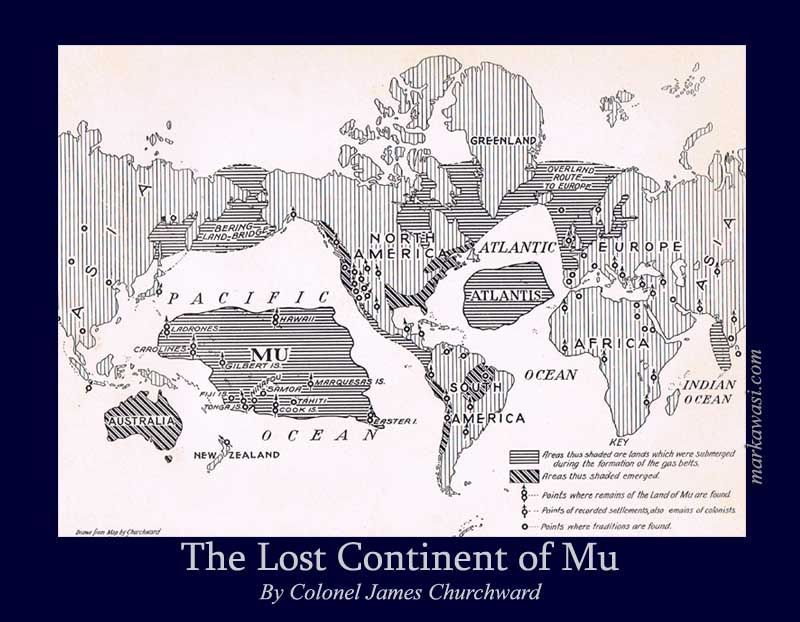Jack E. Churchward
Churchward, Jack E.
Jack E. Churchward is the great-grandson of James Churchward, the creator  of Mu. In 2011 Jack republished what he describes as the definitive edition[773] of James’ 1926 The Lost Continent of Mu which includes a new index and added appendices. It is still just the concoction of a fertile mind. My scepticism and that of many others is reflected in a recent blog from Dale Drinnon(a).
of Mu. In 2011 Jack republished what he describes as the definitive edition[773] of James’ 1926 The Lost Continent of Mu which includes a new index and added appendices. It is still just the concoction of a fertile mind. My scepticism and that of many others is reflected in a recent blog from Dale Drinnon(a).
>For the record, Jack is quite sceptical of his great-grandfather’s theories and has republished some of the earlier material in order “for the reader to evaluate the basis of his argument,”<
Jack has also a promotional website(b), where he candidly wrote(c) that “the Troano Manuscript, as a reference for the sinking of Mu, must be removed from the list, if there is to be any legitimacy accorded to an evaluation of Churchward’s theories on Mu.” Jack was highlighting the unreliability of James’ translation of the Troano Manuscript, influenced as it was by the earlier seriously flawed attempts by Bishop Diego De Landa (1524-1579), Brasseur de Bourbourg and LePlongeon. Jason Colavito has added further comments(d) regarding Jack’s blog.
Jack continued to explore his great-grandfather’s misguided ideas with the publication of The Stone Tablets of Mu [1577] in August 2018.
>In 2019, Jack published Crossing the Sands of Time: An Examination of the History and Legends of the Great Uighur Empire [1778]. We are told that “This book was motivated by the author’s interaction with Uyghur scholars and the marked difference between the real history and that espoused by his great-grandfather, James Churchward. During the research, other theories surfaced and are addressed as well. Included are appendices containing all the elder Churchward’s mentions of the Uighurs allowing the reader to judge for themselves the veracity of his pronouncements.”<
(b) https://www.my-mu.com/bstore.html
(c) https://blog.my-mu.com/?p=2272
(d) https://www.jasoncolavito.com/blog/the-weird-case-of-atlantis-mu-in-the-madrid-codex
Mu *
Mu was first used (invented?) by Brasseur de Bourbourg in 1869 as the name given to a mythical continent that supposedly existed in the Pacific Ocean, according to an incorrect translation of the Codex Troano. At the end of the 19th century, this fictional continent was confusingly moved by Augustus le Plongeon into the Atlantic! Subsequently, le Plongeon’s friend ‘Colonel’ James Churchward moved Mu back to the Pacific in a 1931 book, The Lost Continent of Mu[233], in which he presented it as a kind of Pacific precursor to Atlantis. Churchward claimed that his work is based on inscriptions on the so-called Naacal tablets, which he was allegedly taught to translate by an Indian priest. Churchward is reputed to have devoted 50 years of his life searching for Mu. In 2011 a hoax claim that the Naacal tablets had been rediscovered did nothing but detract further from Churchward’s already dubious reputation(d).
A paper by Megan Wright on the fakearchaeology website offers further debunking of the probably imaginary Naacal Tablets(g).
Churchward was born in England but lived mainly in America. He wrote a book on fly-fishing in Maine and even more incongruously was granted a series of railroad-related U.S. patents. Although he liked to be addressed as Colonel no record of his military service has been found. He never identified the monastery where his priestly mentor lived nor has any monastery ever claimed to possess such tablets. Churchward never produced any evidence whatsoever that the tablets existed. His books cannot be treated as credible as they offer nothing but the outpourings of an over-fertile imagination. At the time of his death, in California, he had a number of additional books in preparation.
Churchward’s grandson, Jack E. Churchward, now has a website(a) devoted to his writings. It is not generally known that the father of modern Turkey, Kemal Ataturk, had Churchward’s book studied in the hope of confirming links between the Turkish people and ancient civilisations such as the Uighur (recently in the news), Maya and Aztec!
In 1969 the French hydrologist Louis-Claude Vincent (1906-1988) published two volumes on the origins of civilisation which he placed in Mu. This was probably the last major work based on the very questionable output of Churchward.
Later psychics embellished the already colourful writing of Churchward and pushed the story from fiction to farce.
Strictly speaking, Mu should not be confused with Lemuria, as the former is just an invention of Le Plongeon while the latter word was originally used as a geological term to describe a hypothetical submerged landmass in the Indian Ocean. Nevertheless, the two terms are now frequently used interchangeably. In an article in New Dawn Magazine, Brian Haughton notes the speculations of some who think that Australia was once part of a sunken Pacific continent(h). Furthermore, a third name, Pan, has also been used to describe a vast sunken continent in the Pacific.
Brien Foerster, the Canadian-reared writer, claims that the Hawaiian Islands are the remains of Mu(b), whereas Churchward considered them to be just a tiny part of his imaginary landmass.
Jason Colavito, following some hate mail from an over-excited Mu ‘believer’, has written an interesting article(c) on the history of Churchward’s lost continent.
Frank Joseph in his most recent offering[1535] has some really nonsensical ideas to offer regarding mythical Mu. He claims that 40,000 years ago “sudden sea-level rises triggered migration from Mu around. The Pacific motherlanders settle on a large, fertile island about 380 kilometers due west of the Straits of Gibraltar. There, the newcomers merge with the native Cro-Magnon inhabitants, resulting in a new, hybrid culture – Atlantis.” He offers no evidence to support any of this and fails to explain how his Mu was inundated, but the new Atlantic home was not.
He then jumps forward to 9600 BC and has Mu flooded once again, followed by another wave of migration to Atlantis. Unsurprisingly, it offers no evidence and no explanation why these migrants would bypass the more accessible continents of Asia, Africa and America and head for an island in the Atlantic, which would have been affected by the same sea-level rise that inundated Mu!
In July 2023, David Hatcher Childress published a lengthy review of the story of Mu on the Ancient Origins website(e). I suppose in keeping with the spirit of our time, recycling is to be encouraged.
Also have a look at an earlier article entitled The Lost Continent that Never Existed: Mu, was published(f).
(b) https://www.grahamhancock.com/phorum/read.php?f=1&i=296625&t=296429
(c) https://www.jasoncolavito.com/blog/today-in-hate-mail-muvians-of-the-world-unite
(d) See: Archive 3033
(f) https://www.todayifoundout.com/index.php/2016/07/history-lost-continent-never-existed-mu/


